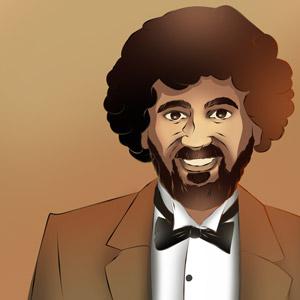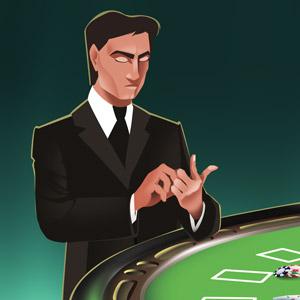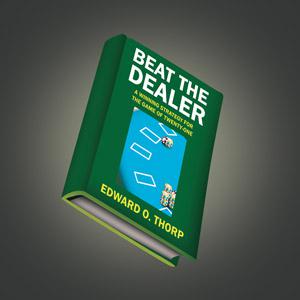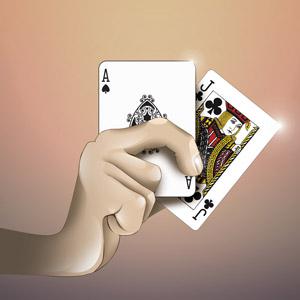The old adage, “the house always wins” might deter players from taking big gambling risks. The house edge, built into every single casino game, is an infernal reminder of the mathematical certainty that the more you gamble, the higher the probability is that you will lose. What if you could change the odds? What if there was a way to tip the advantage in your favor? Some legendary gamblers have been able to accomplish just this by relying on a combination of skill and choosing the right game to play. What game is the right game, you might ask? The answer lies in one of the most popular casino games of all time: blackjack. And Ken Uston was a blackjack legend.
Blackjack is a casino game that offers a low house edge, and for skilled players this can drop to less than 1% with expert strategy. What makes blackjack so unique is the fact that it is the only game on the casino floor where past decisions influence future results. This is where card counting comes in. Planet 7 Casino brings you the story of Ken Uston, one of the most famous blackjack players and card counters in casino history.
The birth of a legend
Kenneth Senzo Usui was born on January 12, 1935 in New York City. Early on, it became apparent that Kenneth was a gifted child. He took on many hobbies from piano to sports, but Kenneth’s true talent lied in numbers. In fact, he was so good at numbers that he was seen as a math prodigy. With a genius IQ, Kenneth even skipped several grades of high school. Now with the last name Uston, Ken would eventually go on to graduate from the University of Connecticut. He would later transfer to Yale at only 16 years of age.
By 1955, aged 20, Uston graduated from Yale and went on to study at Harvard University where he would receive an MBA in Finance. Having learned a strict work ethic from his father, Uston would pursue a career as a successful stockbroker, moving with his wife (and soon-to-be-mother of his three children) to San Francisco. Uston would take on a high paying suit-and-tie job crunching numbers at the Pacific Clearing Corporation, a finance company specializing in the stock market. By working his way up, Uston became one of the top brass of the company. However, it would not take long for his love of numbers to push him in an entirely new direction.
Ken Uston discovers blackjack
On a fateful night in 1965, Uston met someone who would ultimately change his life. This was a man by the name of Al Francesco, a professional blackjack player. Francesco knew how to win at blackjack. He would teach Uston about the exciting world of blackjack card counting, and because of Uston’s affinity for numbers, it would not be long before Uston was able to master the game. This would lead to the development of Uston as one of the world’s premiere blackjack card counters. And he would go on to take the world’s casinos by storm.
What is card counting?
Before we get further into the remarkable true story of Ken Uston, we should look at the key element in it: card counting. Card counting is a tactic used by players at a casino to gain an advantage against the house. One of the biggest misconceptions about card counting is that it is illegal. Card counting is legal, and is a form of advantage play. Despite its legality, casinos frown upon card counting.
They even went as far as to refuse players the right to play in their establishments if they caught a card counter caught. The reason for this is that a skilled card counter can win a lot of a casino’s money, but it takes serious effort. Card counting requires time, patience, and excellent in-game skills. Once a card counter has mastered the technique, they can learn how to play blackjack, and earn serious money. So how does card counting work?
How to count cards in blackjack
In card counting, card values are as follows for a standard 52-card deck:
- cards marked 2-6 are given a value of +1 (plus one)
- cards marked 7-9 are given a value of 0 (zero)
- cards 10-Ace are given a value of -1 (minus one)
As the cards are dealt, a player must add or subtract a value of one (1) or do nothing if the value is zero (0) based on the aforementioned point system. This is known as the running count, and allows players to mentally keep track of the concentration of high and low cards in a shoe. If the value of the running count increases, the advantage shifts to the player. If the value of the running count decreases, the casino has the advantage. Once the running count is established, a true count is formulated based on the total value of each deck based on the running count. Players must change their bets according to these values.
The betting for blackjack card counting goes as follows. If a count is high, a player should increase their wager, if a count is low, a player should decrease their wager. This method is known as the “hi-lo system”, and was first coined by the “godfather” of blackjack, fellow math wizard, Ed Thorp; author of the acclaimed book on card counting Beat the Dealer. If utilized correctly, card counting will give a skilled player just enough of an advantage to take the house and win consistently.
From man to myth
Upon reading Beat the Dealer, Ken Uston became obsessed with blackjack. After his fateful meeting with Francesco, Francesco began teaching Uston everything he needed know about how to win at blackjack and blackjack card counting. The two formed a blackjack card counting team with a small group of other card sharps. After months of practice, they were off to the Las Vegas Strip. Francesco, the mastermind behind it all, was one of blackjack’s most legendary players. He knew that with a mind like Uston’s and the support of the team, they would be unstoppable.
They had to be careful, however. Although blackjack card counting is legal, casinos do not welcome it. Uston had to learn not only how to count cards effortlessly, but also how to hide it in plain sight, right under the noses of casino security and pit bosses. The year was 1974, the heyday of the mob run casinos in Las Vegas. If you were caught trying to take advantage of a casino in those days, you were served mob-style justice. This often not only meant being thrown out of a casino, but risking being permanently banned or taken to a back room to be physically beaten (or worse!).
Under Francesco’s tutelage, Uston learned to count the true count of a 52-card deck in less than 30 seconds. According to Uston’s own words, the curriculum was as tough as anything that he had encountered at Harvard or Yale. Francesco did everything in his power to teach Uston how to ignore distractions. That’s because on a casino floor anything could happen. After extensive practice and training learning how to win at blackjack, Francesco was finally confident with Uston’s abilities. It was time to put his newly learned skills to the test in the real world.
How they did it
By creating a dynamic of team play in blackjack, Francesco’s band of card counting misfits were able to outsmart the casinos they visited. While the casinos were on the lookout for card counters, at that time, they only looked for individual players. The strategy of Francesco’s blackjack card counting team was simple. One player known as the “play caller” would play low stakes at a table, counting cards. Then Uston, the “big player”, who would receive a signal to sit at that same table to bet big. By working in teams spread out through multiple blackjack tables on the casino floor, the pit bosses and casino personnel could not catch their blackjack card-counting scheme.
Winning!
This strategy helped tip the odds in Uston’s favor, and helped he and his team win big. By betting $100-$1,000 per hand, Uston was able to earn the team as much as $60,000 per day, using his card counting techniques. The only occupational hazard became “avoiding the heat”, i.e. not getting caught. The team would alternate casinos on a regular basis so as not to draw too much attention. In fact, Uston would need a disguise. Instead of looking like the card-counting wizard that he was, Uston would hide in plain sight. He even disguised himself as a rambunctious high roller who frequented Vegas on weekends to bet big. It would be this new persona which lead to Uston’s downfall.
From mild mannered executive during the week to go-go gambler, Uston was flying out every weekend from San Francisco to feed his new blackjack addiction. In less than a year after joining Francesco’s card counting team, Uston realized that he enjoyed the high roller lifestyle. He craved the attention that it brought more than the straight edge family life. He grew out a beard and began wearing silk shirts and gold necklaces, eventually leaving his family in California. As the orchestrator of his own “show”, he eventually would receive more freedom than he bargained for.
Problems in Paradise
On top of Uston’s newly found obsession, he still had a family to support and a full-time job in San Francisco. His suit and tie profession of being a stock executive was countered by weekend trips to Glitter Gulch in order to take a chance on how to win at blackjack. Unbeknownst to his team, Uston’s goal was not just money, but to become the best blackjack player ever.
He endeavored to prove to everyone that he was a better than anyone at the casino, a player with real intelligence. Though anyone can learn how to card count, it’s not easy. There are still many variables when it comes to learning how to win at blackjack. A typical count can vary wildly, chances are improved, but there is no guarantee of winning each round. High cards are good for the player for two reasons. There’s a higher probability that the dealer will bust, and a player can get blackjack. Wins can be huge with properly timed bets, but so can the losses.
Pride before the fall
After managing to pull off staggering wins, and averaging as much as $60,000 per day, Uston started to get a little too confident in his abilities. He began taking much bigger risks, not only with his wager amounts, but also in the manner that he wagered. Uston began taking it upon himself to tell the casino pit bosses themselves to place his chips on certain positions at other blackjack tables. A daring move that could potentially expose their card counting team to the house, thus jeopardizing their entire blackjack operation. On top of risky betting techniques, Uston broke one of the team’s vital rules, no drinking while playing. With his confidence soaring high, Uston began getting drunk at the blackjack tables. This would eventually attract even more unwanted attention from the casinos due to his brash behavior.
The Griffin Book
By the mid-seventies, Ken Uston’s card counting tactics along with Francesco’s team had managed to burn the casinos to the tune of a cool $1 million (an amount equivalent to nearly $5 million today). This was a substantial amount of revenue for a small card counting team. With that kind of money, the casinos took notice and eventually were able to spot the same faces appearing at the blackjack tables where Uston played. They identified every card counter on Uston’s team, which led to the group landing in the notorious “Griffin Book”.
The Griffin Book was a ledger utilized by many casinos throughout the 70s and 80s. This ‘blacklist’ identified advantage players, card cheats and sharps. If one casino caught a sharp or a cheat at their venue, this information was distributed between other casinos to prevent such individuals from entering their establishments. The casino photographed Uston’s team, which led to their ban from a multitude of Vegas gambling halls and casino establishments due to their blackjack card counting.
Bad breaks for Uston
By the late 70s Francesco’s team had disbanded, however a defiant Uston refused to allow the casinos to win. With a taste for the high life, Uston was unwilling to let it go. Especially after having quit his job in order to be a full-time gambler. He believed that it was unfair for a casino to kick out a card counter, simply because he was too good. If advantage play was legal, then Uston believed that he should be allowed in a casino.
In spring of 1979, Uston filed multiple lawsuits totaling $85 million against the casinos that barred him from playing blackjack. In his opinion, skilled players had rights, just as any casino-goer or gambler did. By declaring war on Las Vegas, Uston’s actions caused a media frenzy, and he once again took the spotlight as a blackjack player. Uston eventually lost the lawsuits, but vowed not to stop there. He would go on to form his own team, and trained its members to play for him and earn him money.
The former business exec, who first achieved success managing a stock company, was taking his business model to the casinos. He created a team that had a low overhead and high profit margin using card counting in blackjack. There was one catch: capital. Uston needed a large enough bankroll to cover periods of loss, so he decided to sink his entire life savings into his enterprise. Despite the casino bans in effect against him, Uston decided to play at casinos anyway. However, after a bad run in Reno, he eventually caught a beating so bad that it left him with broken bones and a bloodied face.
Atlantic City and beyond
No longer welcome in Las Vegas, Uston took his talents to Atlantic City, the gambling Mecca on the eastern coast of the U.S. Uston, and many other blackjack sharps, had a heard of a new ruling by the New Jersey Gaming Commission. Formerly, counters could play at Atlantic City casinos. But dealers shuffled decks so often that even the most skilled sharps would lose count.
However, on January 7, 1979, the New Jersey Casino Control Commission adopted a new rule requiring casinos to play decks out longer before shuffling, including blackjack. This new ruling was a godsend for counters. It enabled them to gain a legal advantage over the house. For professional gamblers and card counters it was open season. The casinos could not kick them out for card counting, so they swarmed, with Uston being among them.
Card counting curtailed
Following the ruling, Uston played marathon blackjack sessions with his team for the next two weeks. Performing overwhelmingly well, the team was on a pace to earn nearly $25 million dollars in winnings annually. However, they would never see the full figure. Because on January 30, 1979, the casinos saw their fatal mistake and no longer allowed gamblers to count cards on their floors.
Despite this, Uston was still not deterred. He would go on to travel the world, getting thrown out of nearly every major casino around. Once he could no longer gamble professionally, Uston ultimately used his fame to become a casino consultant (even making an appearance for a Resorts International Casino T.V. ad in Atlantic City).
Tragically, Ken Uston died of heart failure in 1987 at the age 52. But not before he managed to solidify a reputation as one of the greatest blackjack players of all time. His legacy lives on among other blackjack greats such as Thorp, Francesco and Johnson.
Conclusion
OK! So you’ve learned about Ken Uston, one of the greatest players in casino history. Now you know a bit about what it takes on how to win at blackjack. Would you like to take the house and win big? We suggest you head over to Planet 7’s online casino blackjack page. Hone your own blackjack skills in a one-of-a-kind online casino experience.
Be sure to check out our great selection of real money online casino games to play. Planet 7 Online Casino offers some 200 incredible high stakes casino games for all of your online casino game needs. Play blackjack, and specialty games like roulette, video poker and even slots! Sign up with Planet 7 Online Casino free today to utilize the no download instant play feature. Or make a deposit to win at blackjack today!









